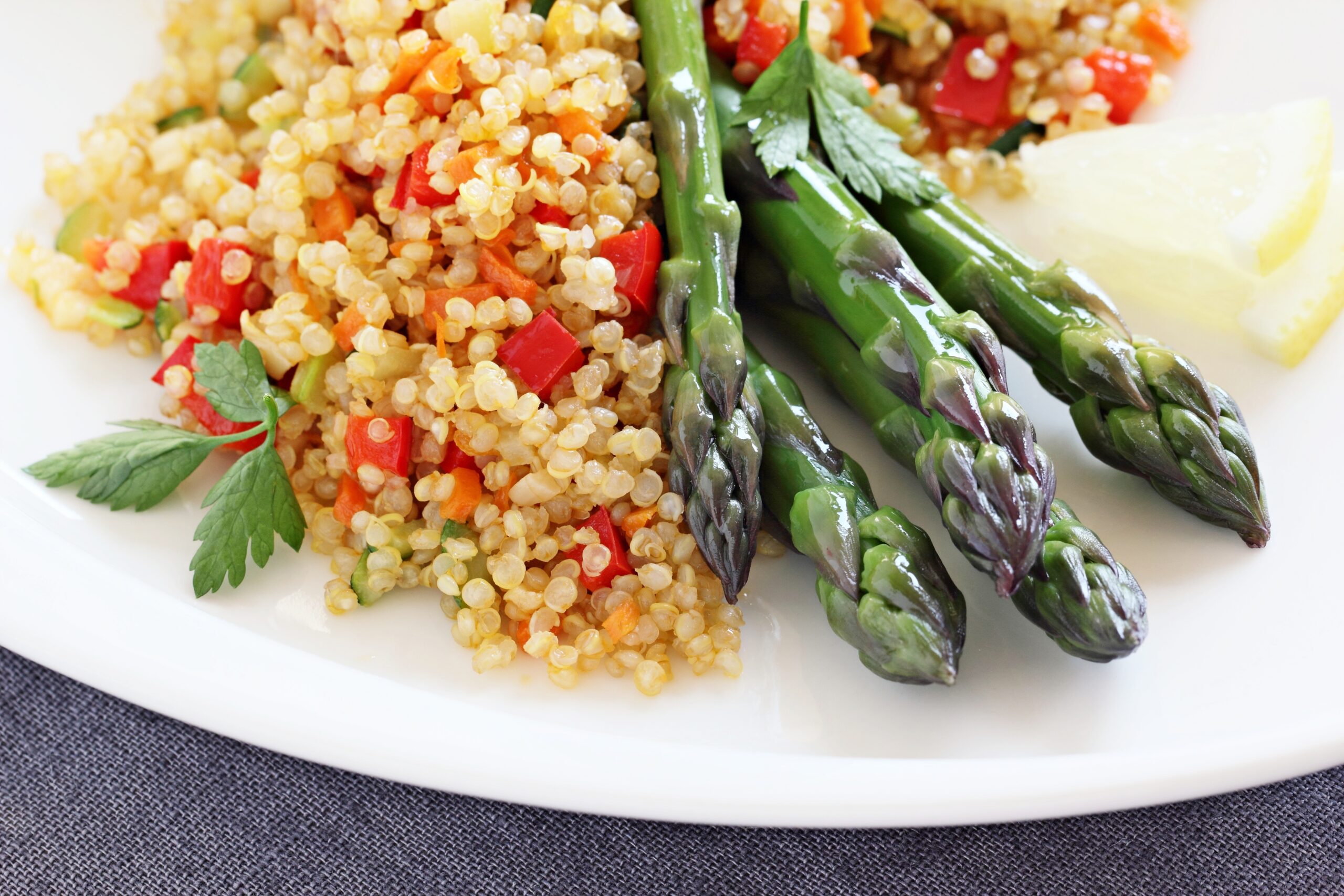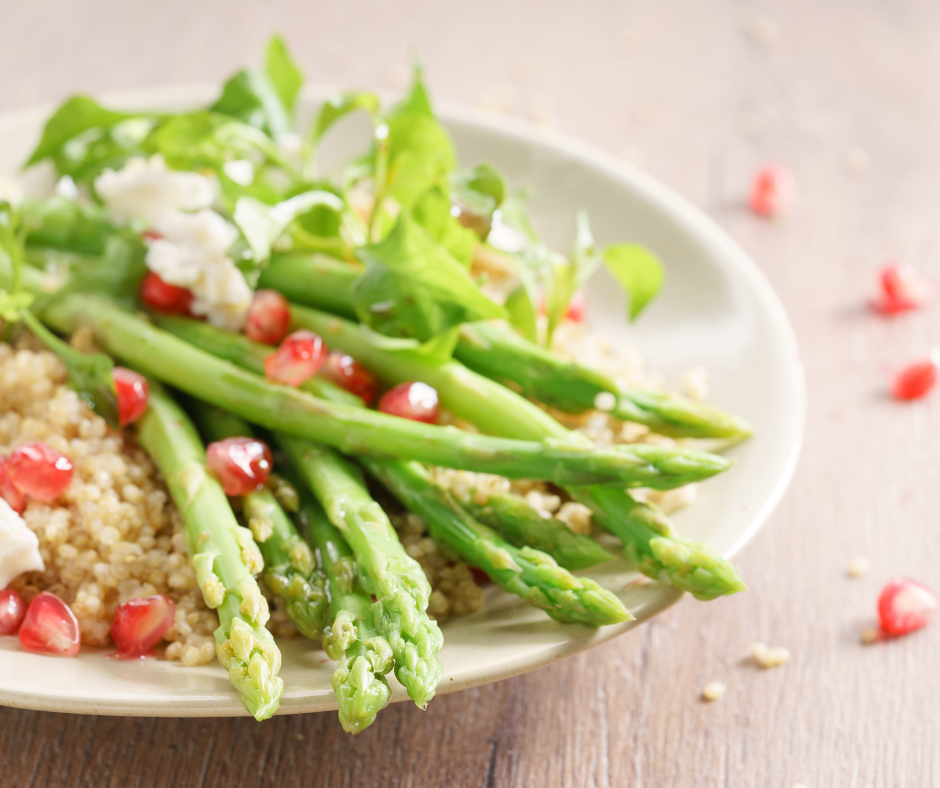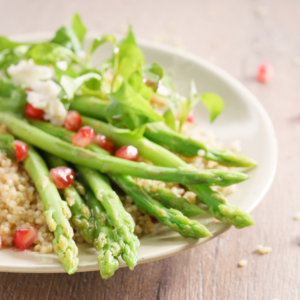

National Quinoa Day is celebrated on January 16 every year. This day is set aside to honor all things quinoa, including delicious dishes like Quinoa Asparagus Pilaf. A known superfood, quinoa is full of dietary fiber and proteins. Originally cultivated in South America, the popularity of the grain spread in the U.S. as a gluten-free alternative to wheat and wheat-based dishes.
Eastern View: Quinoa (pronounced KEEN-wah) is a seed that provides an excellent source of protein. Quinoa is good for all the doshas. It is easy to prepare, easy to digest, and nutrient-dense, quinoa is a simple, practical, and straightforward choice for everyone. Recipes like Quinoa Asparagus Pilaf showcase its versatility and appeal.
Quinoa can help curb carb cravings and help you maintain a healthy weight. Often, carbohydrate and sugar cravings are protein cravings in disguise. If you crave protein, which Pittas often do – make quinoa your first choice.
Quinoa provides the satisfaction of carbohydrates but also feeds your hidden protein craving. It’s a sattvic food promoting a feeling of calmness and peace, It is a nourishing and cooling food with its slightly sweet taste and helps ground the central nervous system.
As a natural antioxidant, anti-inflammatory food that is just loaded with vitamins, minerals, fiber, heart-healthy fats, and a vegetarian “complete protein,” quinoa must be considered a staple in your diet, especially in winter as the need for healthy high-protein foods increases.
A dish like Quinoa Asparagus Pilaf is an excellent example of this, combining the health benefits of quinoa with the deliciousness and nutritional value of asparagus.
Western View: Quinoa offers a compelling array of health benefits. It contains more protein (14% by mass) and fat than most grains which makes it an excellent alternative to white rice or refined carbohydrates, especially for vegetarians. E
ven NASA recognizes quinoa’s haloed health status, proposing quinoa as the perfect food to take on extended space flights. Quinoa is rich in iron, and contains more calcium than milk; it is rich in magnesium, and phosphorus, and its magnesium that relaxes and nourishes the heart and muscles, while it promotes heart function.
In addition to being a high-protein grain alternative, perhaps quinoa’s most current claim to fame is its effect on blood sugar. As a low-glycemic food, it exerts little blood sugar stress on the body, but its high fiber content helps to slow the absorption of other sugars from the digestive tract into the bloodstream. In one study, it outperformed 10 other Peruvian grains for its effects on weight and blood sugar.
Interestingly, even though quinoa maintained healthy low blood sugar levels, it provided more satisfaction, satiety, and fullness after the meal compared to wheat or rice, according to the Satiating Efficiency Index. It also has a very high magnesium content that supports healthy blood sugar and healthy blood pressure levels.
In short a wondergrain!!

In conclusion, quinoa is not just a versatile superfood, but also an incredible source of nutrition and well-being. With dishes like Quinoa Asparagus Pilaf, it’s easy to see how food can be both delicious and therapeutic.
If you’re interested in discovering more healing recipes, we invite you to explore our “Meals That Heal” in our integrative resources. Here, you will find a variety of recipes that not only nourish the body but also promote overall health and wellness.

The Holistic HIghway integrates traditional Western medical practices with Ayurveda medicine, creating a focus on prevention through nutrition, diet, and exercise; use of the latest genetic testing and other diagnostic techniques; and prescribed combinations of botanical medicines, supplements, therapeutic diets, detoxification programs, or stress-management techniques.

Integrative Health Expert | Ayurveda Practitioner | Author | Speaker
Kerry is a globally recognized leader in integrative medicine and the science of health known as Ayurveda. She is passionate about raising awareness of the need for a change in contemporary medicine that focuses on patient empowerment and a health-based (rather than disease-based) medical system.
Kerry is connected with The University of Pittsburgh Center for Integrative Medicine and remains a pioneer in the field of integrative medicine where she has developed a personalized system to manage chronic disorders by incorporating fundamental changes in diet, behavior, and stress while focusing on genetics.
This individualized program is so successful that many of her clients have achieved maximum healing and vitality after years of chronic problems!
More to Explore